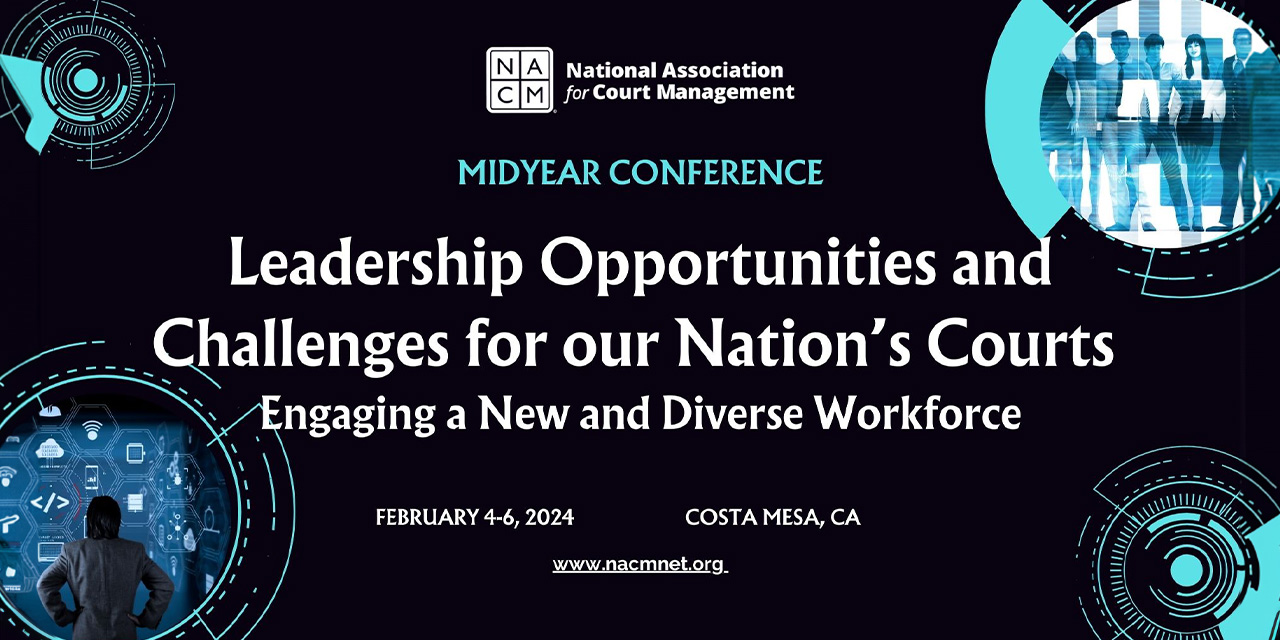Costa Mesa, California played host to 388 in-person and 40 live-stream participants for the 2024 Midyear Conference of the National Association for Court Management. The interactive live-stream sessions were hosted by Melinda Brooks and Kendra Escudero, where participants discussed the sessions that they attended and how they applied to the daily realities of court management.
NACM chose the conference theme Leadership Opportunities and Challenges for our Nation’s Courts, with plenaries and workshops exploring the engagement and retention of the court’s workforce. Integral to the conference theme were the topics of parallel challenges of a competitive talent landscape, a multigenerational workforce, and the need to promote diversity.
The conference officially kicked off Monday morning with a warm welcome from Presiding Judge Maria Hernandez of the Superior Court of Orange County. Dima Ghawi followed with a plenary session, “How to Future Proof Your Court: Engaging Generations Y to Z,” and signed copies of her book Breaking Vases, which were given to some attendees. Ghawi’s keynote explored the keys to motivating multigenerational teams and providing actionable tips in engaging them, giving the teams a purpose they crave, and inspiring them to overachieve. By bridging the disconnection between generations, organizations can harness the innovative talents of their employees while keeping them dedicated to the team’s mission.
This is the time we have the most generations in the workplace—Baby Boomers (1946-64), Generation X (1965-80), Millennials (1981-96), Generation Z (1997-2012), and Generation Alpha (2013-25). Ghawi alerted the participants that we are all in the education business and we will see fewer people with degrees in the future, so we must be equipped with a training plan. Staff also want flexibility, so we need to consider work outside of traditional hours and work/life balance.
Ghawi also led a plenary follow-up session: “Unstoppable Courage: Shattering Limitations and Daring to Thrive.” During this session, she told her personal and powerful story of transformation. Her strength and resilience impressed participants and encouraged them to face and conquer their internal limitations. She dared each attendee to look deeper into their own internal limitations and equip themselves with the tools and inspiration to emerge as empowered individuals and leaders. The session was capped off with audience participants literally breaking vases.
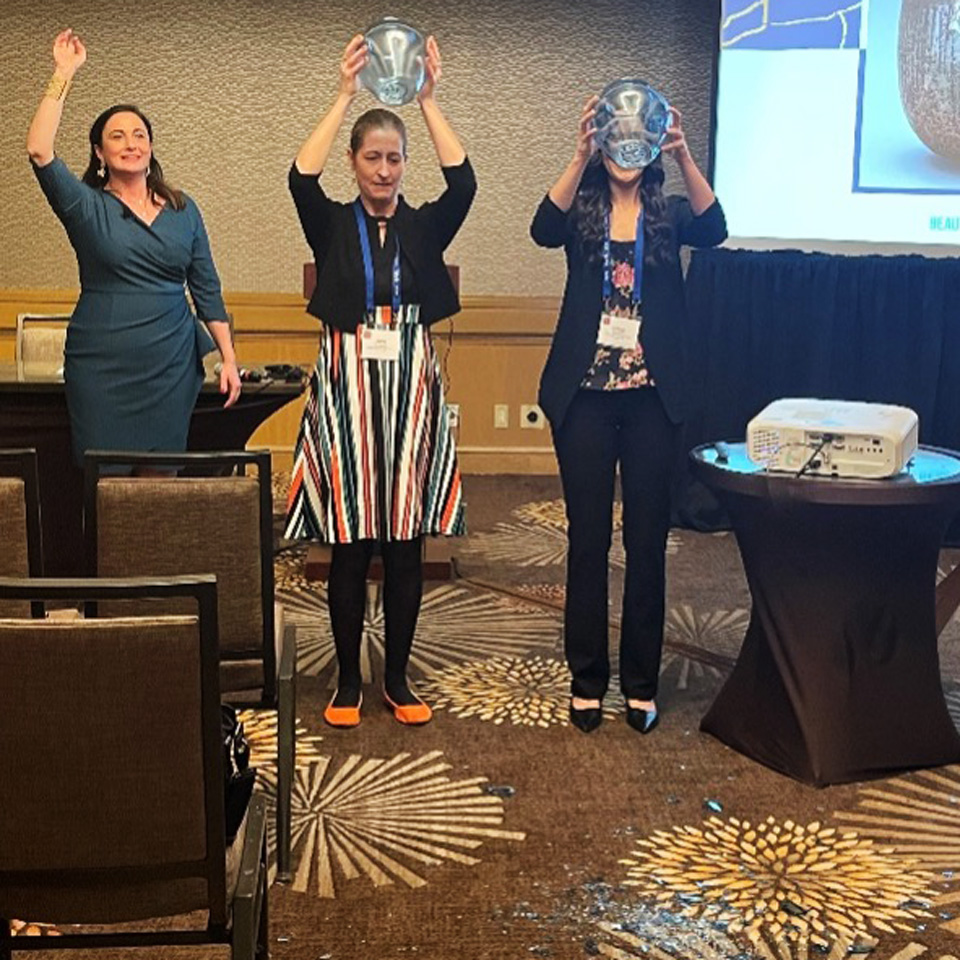
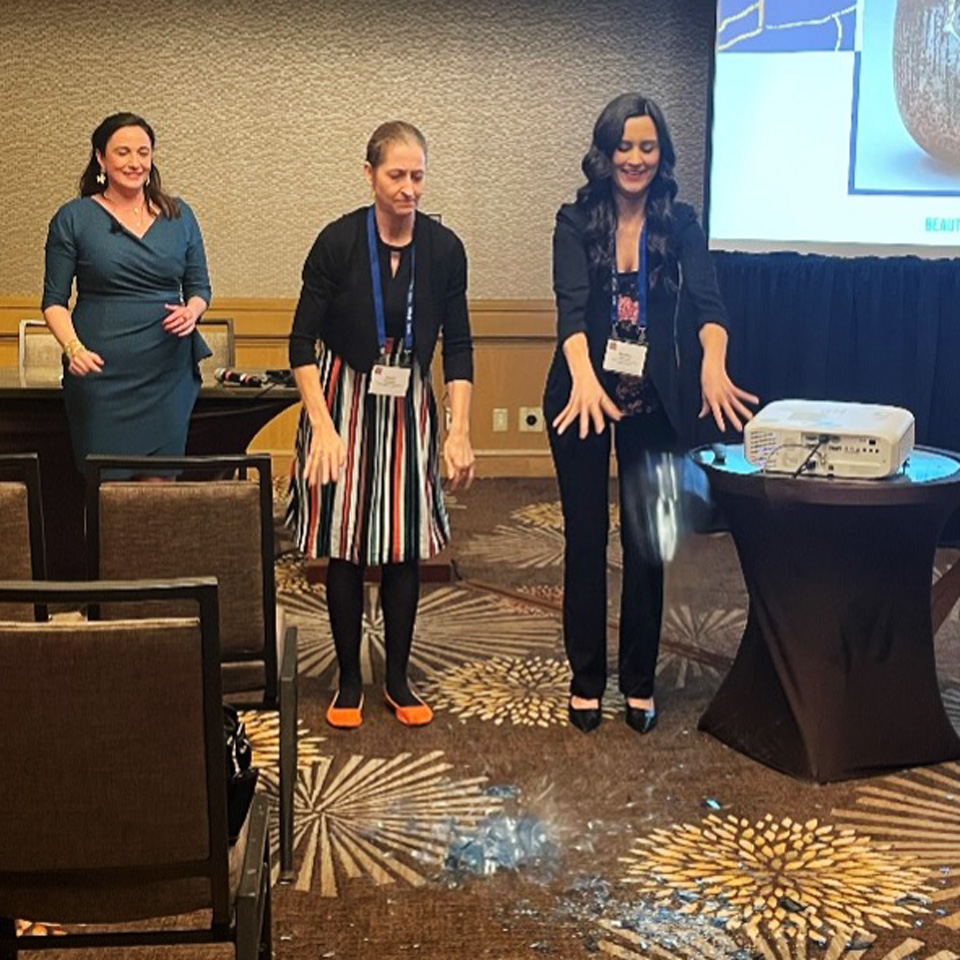
Monday sessions also included CORE® workshops on “Workforce Sustainability,” “PHASE: A Practical Approach to Implementation,” and “LEVEL UP Your Leaders (and Yourself).” In “LEVEL UP,” Jamie Velazquez of Orange County Superior Court described development for upper levels of leadership as crucial to the perpetuity of successful court administration. “LEVEL UP,” which stands for Learning, Engaging, Visualizing, Evolving, Leading for Unlimited Possibilities, was created to do just that. The program was developed to focus leaders preparing for upper and executive leadership roles and those wishing to strengthen their leadership skills.
The Monday afternoon session enlightened all with the topics of “Reengaged: How Salsa, Football, and Mystery Captivated Staff,” “Alternative Uses for Guided Interviews,” “Court Leadership and the Mandate for Resilience,” and various AI assistance sessions for courts.
Before the opening session on Tuesday, NACM held a “Coffee Conversation” open discussion on NACM publications. The session reviewed how to submit articles to Court Manager and Court Express. Audience members also shared ideas for article topics, webinar topics, and conference sessions they would like to see in the future. A virtual “Coffee Conversation” also engaged participants from across the country. These discussions allowed participants to not only discuss conference content, but also explore various components of NACM publications and committee participation, learn more about NACM resources, and check out some of the recent improvements to the website.
Locations of Virtual Participants in NACM’s Midyear Conference
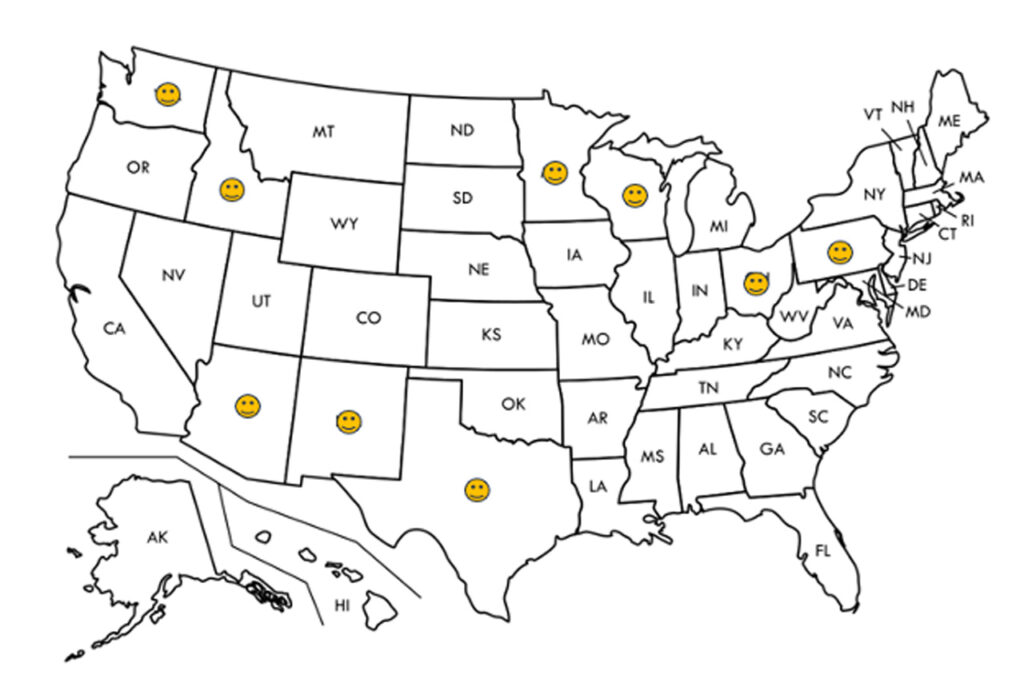
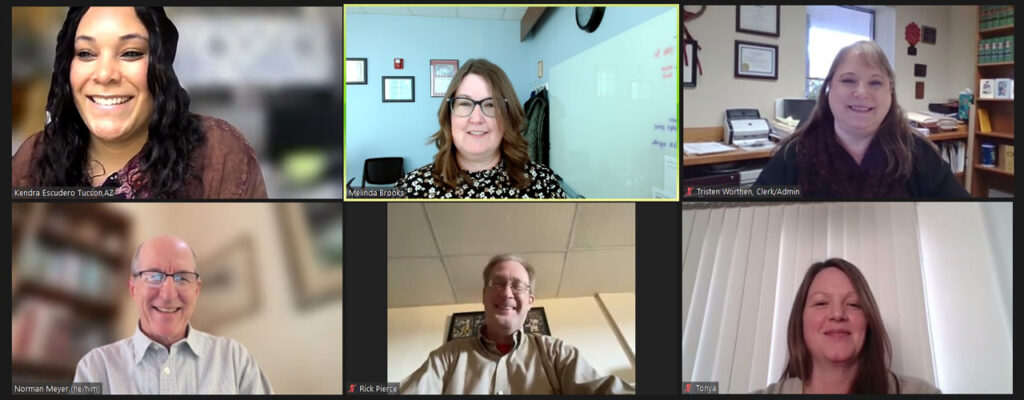
Both sessions were well received and will be held and further developed for future conferences.
Tuesday sessions continued to highlight employee engagement, leadership development, and court service improvements. Sessions included “Best Practices for Equitable and Inclusive Hiring,” “Supporting Emerging Adults in the Justice System,” “Data Visualization and Storytelling,” “Why CORA?,” and “Collaborating to Advance the Role of DEI in the Judiciary.”
The breakout titled “Wellness for Court Leaders: Put Your Oxygen Mask on First” was led by John Bello, Sheila Casey, Aaron Hood, and Kristen Trebil-Halbersma. Each discussed how important a court leader’s mental health is and explained that you cannot lead a mentally healthy and diverse workforce unless you are taking care of yourself. Speakers stated that 41 percent of workers feel burned out, which leads to stress, depression, drug use, and general health issues. As leaders, we must do good things for ourselves to show-up and do good work. Such things could be just taking a walk, working out, listening to music, meditating, reading, writing, or bike riding. It was suggested that you start small and block out time on your calendar for a break and always remember to hydrate.
Tuesday afternoon was entertaining for participants in the CORE® session “Can We Lead Leaders to an Ethical Tomorrow?” Peter Kiefer and Karl Thoennes led several robust discussions on the tension of being a supervisor, a mentor, and a friend to colleagues. Discussion took place on the fact that actions deemed acceptable a few years ago are now off limits. Participants engaged in role-playing scenarios and provided comic relief.
The conference closing plenary was provided by Arbinger Consultant Desmond Lomax, who shared the benefits of creating an outwardly inclusive mindset. Mr. Lomax was very engaging and proved to be the perfect late afternoon speaker. He asked the audience to consider the question “Do people really matter like I matter?” He shared when we focus on results alone, we tend to be concerned about what matters to us and our objectives, which Lomax called “inward mindset.”
He challenged us to reflect on who we may be impacting when we are focused inward. By changing our mindset outwardly, it will help us see others as people, recognizing they have their own needs and goals. One way we can start thinking with an “outward mindset” is by asking our staff “what it is like working for us and what makes it hard working for us.” Of course, we need to be open to the information we receive. By changing our mindset outward, it will help drive our behavior toward others.
Ultimately it is behavior that drives results, which in turn assists in establishing the culture of the organization. The organization’s desired culture should be one of grace and space. Leaders need to call people forward, not out. If we solely focus on behavior rather than mindset, we will continue to struggle. Creating an environment where someone can sit in front of another and see their humanity, heals organizations. Lomax will be presenting at the annual conference.
The 2024 NACM Midyear Conference exceeded expectations, providing exceptional educational programming and networking. NACM looks forward to seeing everyone in New Orleans, Louisiana for the annual conference, July 21-25, 2024. The conference will expand on the leadership theme of Leadership Opportunities and Challenges for Our Nation’s Courts. Sessions will concentrate on the skill sets needed to lead upcoming new leaders into the future and create future-ready courts. Registration information can be found on the NACM website.

ABOUT THE AUTHORS
Melinda Brooks is specialized dockets manager, Franklin County Court, Columbus, Ohio, and editor of Court Manager.
Tina Mattison is deputy court administrator, Pima County Consolidated Justice Courts, Tucson, Arizona, and president-elect of NACM.
Dawn Palermo is judicial administrator, Jefferson Parish Juvenile Court, Harvey, Louisiana, and a member of the NACM Board of Directors.

